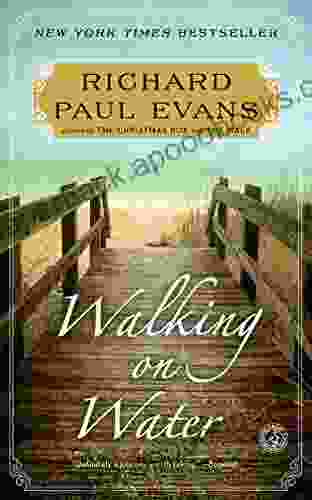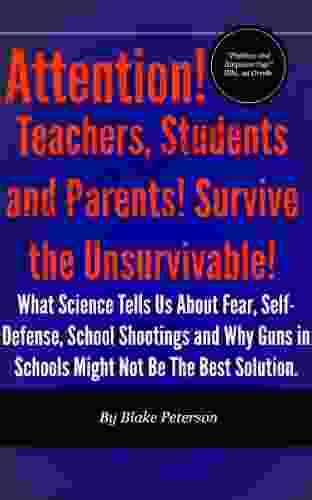Attention Teachers, Students, and Parents: Survive the Unsurvivable – What Science Can Teach Us About Overcoming Trauma

Trauma is a prevalent issue in today's society, affecting individuals of all ages and backgrounds. From natural disasters and accidents to abuse, violence, and neglect, traumatic events can have a lasting impact on our physical, emotional, and psychological well-being. In the classroom, trauma can manifest in various ways, hindering students' learning, behavior, and social interactions. Teachers and parents play a crucial role in supporting students and children who have experienced trauma, and equipping them with the knowledge and skills to cope and thrive.
"Survive the Unsurvivable: What Science Can Teach Us About Overcoming Trauma" is a comprehensive guide that provides a deep understanding of trauma, its effects, and evidence-based strategies for healing and recovery.
Trauma is a response to an overwhelming and deeply distressing event that exceeds an individual's ability to cope. It can be caused by a single incident, such as a car accident or a natural disaster, or by repeated exposure to adverse experiences, such as abuse or neglect. Trauma can have a profound impact on the brain, body, and emotions, leading to a range of physical, psychological, and social problems.
4.3 out of 5
| Language | : | English |
| File size | : | 4210 KB |
| Text-to-Speech | : | Enabled |
| Screen Reader | : | Supported |
| Enhanced typesetting | : | Enabled |
| Word Wise | : | Enabled |
| Print length | : | 34 pages |
| Lending | : | Enabled |
The effects of trauma can vary greatly depending on the individual and the nature of the traumatic event. However, some common symptoms include:
- Physical symptoms: Headaches, stomachaches, fatigue, sleep disturbances, difficulty concentrating, and increased sensitivity to stimuli.
- Emotional symptoms: Anxiety, depression, anger, guilt, shame, and numbness.
- Behavioral symptoms: Avoidance of reminders of the trauma, risky behaviors, self-harm, and relationship difficulties.
- Cognitive symptoms: Difficulty concentrating, making decisions, and remembering information.
Trauma can have a significant impact on students' learning and behavior in the classroom. Traumatized students may exhibit:
- Academic difficulties: Difficulty paying attention, remembering information, and completing assignments.
- Behavioral problems: Acting out, withdrawing, or avoiding social interactions.
- Emotional dysregulation: Difficulty managing emotions, leading to outbursts or withdrawal.
- Difficulty forming relationships: Struggling to trust others or build meaningful connections.
Teachers and parents play a vital role in supporting students and children who have experienced trauma. By understanding the effects of trauma and creating a safe and supportive environment, they can help these individuals heal and thrive.
- Create a safe and supportive environment: Provide a predictable and consistent routine, establish clear rules and expectations, and ensure that students feel respected and valued.
- Be patient and understanding: Recognize that students who have experienced trauma may have difficulty paying attention, following instructions, and controlling their emotions. Offer extra support and encouragement, and avoid punishment or criticism.
- Promote self-regulation: Teach students coping mechanisms for managing stress and emotions, such as breathing exercises, mindfulness, and positive self-talk.
- Encourage social support: Help students build healthy relationships with peers and adults. Encourage them to join clubs or activities where they can connect with others.
- Collaborate with professionals: If you suspect that a student is struggling with trauma, consult with a school counselor, psychologist, or other mental health professional. They can provide specialized support and therapy to help the student process their trauma and develop coping mechanisms.
Science provides valuable insights into the mechanisms of trauma and offers evidence-based strategies for healing and recovery. These strategies include:
- Trauma-focused therapy: A type of psychotherapy that helps individuals identify and process their traumatic experiences in a safe and controlled environment.
- Cognitive-behavioral therapy (CBT): A type of therapy that focuses on changing negative thoughts and behaviors that contribute to trauma symptoms.
- Eye movement desensitization and reprocessing (EMDR): A type of therapy that uses eye movements to help individuals reprocess traumatic memories and reduce their emotional impact.
- Mindfulness: A practice that involves paying attention to the present moment without judgment. Mindfulness can help reduce stress, improve emotional regulation, and increase resilience.
- Medication: In some cases, medication may be necessary to manage symptoms of trauma, such as anxiety or depression.
Trauma is a complex and challenging issue, but it is one that can be overcome. By understanding the effects of trauma and implementing evidence-based strategies for healing and recovery, teachers, students, and parents can help survivors of trauma rebuild their lives and reach their full potential.
4.3 out of 5
| Language | : | English |
| File size | : | 4210 KB |
| Text-to-Speech | : | Enabled |
| Screen Reader | : | Supported |
| Enhanced typesetting | : | Enabled |
| Word Wise | : | Enabled |
| Print length | : | 34 pages |
| Lending | : | Enabled |
Do you want to contribute by writing guest posts on this blog?
Please contact us and send us a resume of previous articles that you have written.
 Book
Book Novel
Novel Page
Page Chapter
Chapter Text
Text Story
Story Genre
Genre Reader
Reader Library
Library Paperback
Paperback E-book
E-book Magazine
Magazine Newspaper
Newspaper Paragraph
Paragraph Sentence
Sentence Bookmark
Bookmark Shelf
Shelf Glossary
Glossary Bibliography
Bibliography Foreword
Foreword Preface
Preface Synopsis
Synopsis Annotation
Annotation Footnote
Footnote Manuscript
Manuscript Scroll
Scroll Codex
Codex Tome
Tome Bestseller
Bestseller Classics
Classics Library card
Library card Narrative
Narrative Biography
Biography Autobiography
Autobiography Memoir
Memoir Reference
Reference Encyclopedia
Encyclopedia Jesse Thistle
Jesse Thistle Johannes Morsink
Johannes Morsink Jo Freeman
Jo Freeman Jennifer Bryan
Jennifer Bryan Kt Belt
Kt Belt Ronald H Heck
Ronald H Heck Jillion R Rising
Jillion R Rising Paul Krugman
Paul Krugman Michael Brocken
Michael Brocken Moyra Mcneill
Moyra Mcneill Lisa Cherry
Lisa Cherry Kylie Message
Kylie Message Jerry Oltion
Jerry Oltion Jill Lynn
Jill Lynn Joann Bortles
Joann Bortles Jigar Shah
Jigar Shah Linda Greenhouse
Linda Greenhouse Tracy L George
Tracy L George Jeremy Harding
Jeremy Harding Paul J Riccomini
Paul J Riccomini
Light bulbAdvertise smarter! Our strategic ad space ensures maximum exposure. Reserve your spot today!
 Howard PowellFollow ·7.2k
Howard PowellFollow ·7.2k Al FosterFollow ·14.4k
Al FosterFollow ·14.4k Jacob HayesFollow ·12k
Jacob HayesFollow ·12k Colby CoxFollow ·8.1k
Colby CoxFollow ·8.1k Art MitchellFollow ·15.9k
Art MitchellFollow ·15.9k Sammy PowellFollow ·6.4k
Sammy PowellFollow ·6.4k Gary ReedFollow ·15.2k
Gary ReedFollow ·15.2k Anthony BurgessFollow ·2.3k
Anthony BurgessFollow ·2.3k

 Preston Simmons
Preston SimmonsEmbark on a Literary Odyssey with "Walking on Water": A...
Prepare to be swept...

 Ernesto Sabato
Ernesto SabatoUnlocking Policy Analysis: Dive into the Intricacies of...
: The Realm of Policy...

 Forrest Reed
Forrest ReedThe Road to Grace Walk: A Journey of Spiritual Growth and...
In the tapestry of life, we...

 Evan Simmons
Evan SimmonsTip Neill and the Democratic Century: A Political Odyssey...
The Rise of a Political Giant In the...

 Mark Mitchell
Mark MitchellUnwrap the Magic: A Review of Christmas Memory by Richard...
As the cold winter months draw near, and...

 Percy Bysshe Shelley
Percy Bysshe ShelleyBeyond the Veil: Delve into the Realm of Spirit with In...
Unveiling the Mysteries of the Unseen...
4.3 out of 5
| Language | : | English |
| File size | : | 4210 KB |
| Text-to-Speech | : | Enabled |
| Screen Reader | : | Supported |
| Enhanced typesetting | : | Enabled |
| Word Wise | : | Enabled |
| Print length | : | 34 pages |
| Lending | : | Enabled |












